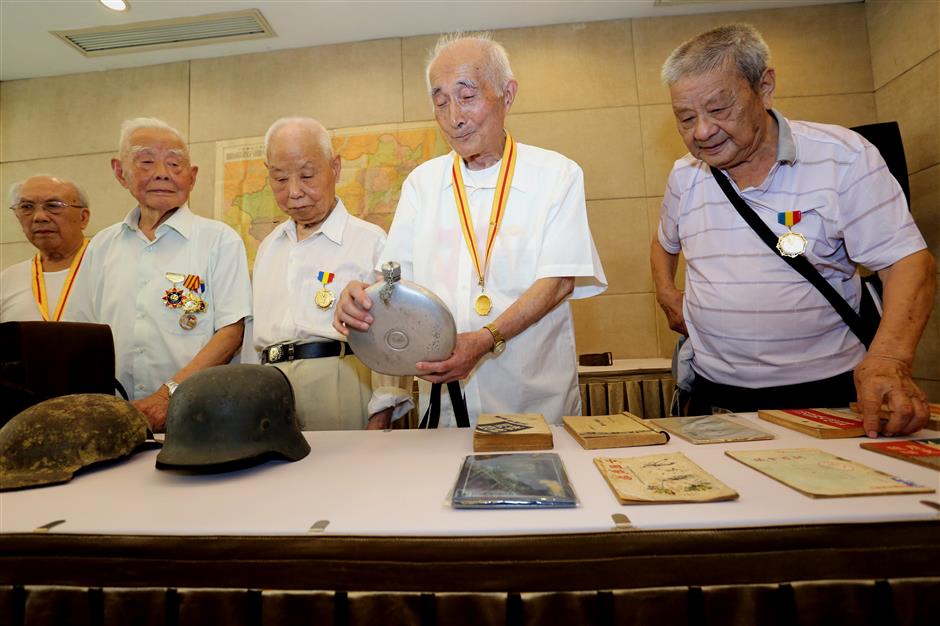96-year-old marks Victory Day, recalls road-building war feat

Feng Zongyao, a veteran from the War of Resistance against Japanese Aggression, looks at a canteen used during WWII as he and four other veterans attend a commemoration in Zhongshan Hotel, Nanjing, eastern Jiangsu Province, yesterday, to mark the 73rd anniversary of the victory. The site was used as a military court to try Japanese war criminals.
Yang Xiandou was only 15 years old when he joined thousands of local people to build a road through the mountains in southwest Yunnan Province so that the allied forces could send supplies to help China fight the Japanese aggressors during World War II.
The Japanese army escalated the invasion into a full-scale war in 1937, blocking ports in China’s coastal areas and cutting off the Yunnan-Vietnam railway, thus making it very difficult for China to get supplies from allies.
At that critical moment, a road was the key to all.
Memories of the hard days eight decades ago resurfaced as China yesterday marked the 73rd anniversary of the victory of the War of Resistance against Japanese Aggression and the World Anti-Fascist War.
Japan signed the formal surrender on September 2, 1945, and China celebrated its victory the following day and declared September 3 Victory Day.
Yang, born in 1922, was the youngest of four kids in a farming family living in Lijia Village in the city of Baoshan.
Local leaders came to every household and required villagers to help build a road linking Yunnan and Myanmar.
As the dawn broke on a cold winter day, the little boy set off on foot with a pole. He packed tools, including a hoe, two dustpans and a sickle and daily necessities for ten days — a quilt, clothes, as well as potatoes, rice and pickle.
“To get to the construction site, we had to climb up steep mountains more than 2,000 meters above sea level, with more than 30 kg of luggage for at least one day, from dawn to dusk,” he said.
On arriving, they had to build a shed in the nearby mountains first. Adults and the strong were responsible for the work. They cut four trees to form the foundation and then used sheets made of bamboo for the walls and roof. The only things inside were self-made straw mattresses which served as bed.
“A larger shed can fit four people while a smaller can fit two,” Yang said.
From morning to night, the road was filled with thousands of workers.
“Without any advanced equipment or machinery, everything depended on human forces,” he said.
Yang worked a total of 100 days, completing over 40 kilometers of road.
Besides Yang, about 200,000 Chinese people paved a miracle in road history, completing more than 540 km in nine months during the war, about half of the 1,146-km China-Myanmar road (also known as the Burma Road) that connects Kunming, the provincial capital of Yunnan, with Lashio of Myanmar.
“The China-Myanmar road played a vital role in China’s victory in its war against Japanese invasion, and the construction workers are the real heroes who made the impossible come true,” said Yu Ge, writer and WWII expert.
“They leave us with great spiritual heritage, motivating Chinese to pursue a better life with hard work.”
About 80 years later, most of the workers have died and Yang, 96, is one of less than 10 workers still alive. His life has undergone tremendous changes. Yang retired from a forest farm in 1980 and now enjoys pension and subsidies of about 3,000 yuan (US$439) a month.















